The Banned: Stories of Austin Immigrants Affected by the Trump Order
By The Reporting Texas staff
On Jan. 27, President Donald Trump signed an executive order temporarily banning citizens of seven Muslim-majority countries from entering the United States and blocking all refugees from Syria. The president said his goal was to protect against terrorists.
The ban affected tens of thousands of people — many with visas or legal residency status — who were detained at airports, sent back to where they came from or stopped from boarding planes bound for the U.S.
Trump’s order affected 110 University of Texas at Austin students, researchers and faculty members, most of them from Iran. Federal courts have blocked enforcement of the ban, but uncertainty over what could happen next has upended people’s lives and dreams and altered their views of America.
This article was updated on Feb. 24, 2017.
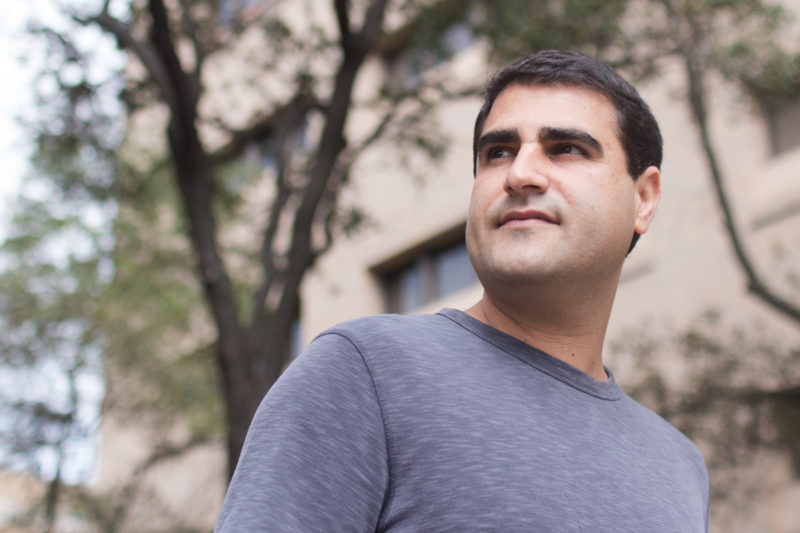
Iranian native Ehsan hopes to get a visa to work in the U.S. but is worried about his chances. Lynda Gonzalez/Reporting Texas
‘It gets very stressful’
Ehsan has tried to avoid the news since President Trump announced his executive order banning travel from Iran and six other countries.
“It gets very stressful sometimes,” says the doctoral student who is in his final semester at UT-Austin.
Some of the stress has lifted since a federal appeals court blocked enforcement of the ban. But there are still many unknowns, and Ehsan fears that the government could make changes to tighten the visa process.
He has a job offer from a company in Florida that is willing to sponsor him for an H-1B visa, which is for people from other countries who have specialized skills.
By the numbers
An H-1B would allow him to stay in the U.S. for up to six years, during which he could apply for permanent residency. That was the route he had planned to take.
“I need to see if they really want me to be here,” Ehsan says of the U.S. government. “I don’t want to impose myself here. If they don’t want me here, there’s no reason for me to stay.”
Ehsan considers himself fortunate, however, because returning to Iran is always an option if he is unable to find work in another country. Unlike Syria and Iraq, Iran is not a war zone.
“What can they do? They have nothing to go back to,” he says of Syrian and Iraqi students.
His thoughts also turn to students in Iran.
“This is the time students start to apply for visas to the U.S.,” he says. “It seems that they might not be able to come here next year, because the visas will not be issued.”
— Molly Smith
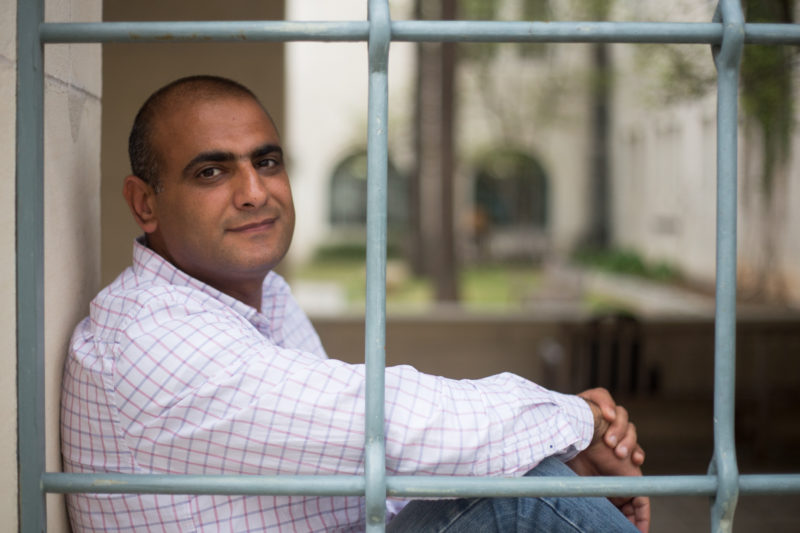
Mahmood Fkaiki, a Ph.D. student at UT-Austin, came to the United States to continue his education in Middle Eastern studies. He said he still views the U.S. positively despite President Trump’s executive order. Lynda Gonzalez/Reporting Texas
‘America is bigger than Trump’
Born, raised and educated in Baghdad, Mahmood Fkaiki came to the United States, “the country of dreams” in his mind, to pursue his doctoral degree in Middle Eastern studies five years ago.
“When I studied in college, I had a dream to come here to continue my study,” Fkaiki says with a smile.
While Fkaiki, 36, still needs a year and a half to graduate from UT-Austin, his J1 visa will expire in August. Because of President Trump’s executive order, he is worried about whether or not he can renew it.
“It’s still not clear for me or for other foreign students from the seven countries. The U.S. is built on diversity, which makes it very strong. That is, if there is no diversity, there is no strong country.”
About this project
Fkaiki has five brothers and two sisters, but he hasn’t seen any of them since he left home five years ago. Fearful that he would not be able to re-enter the U.S., he did not go to Baghdad for his father’s funeral.
Although he’s worried about the travel ban, he says he still has “a positive feeling about this country.”
“America is bigger than Trump,” he says. “People here are very nice, very kind.”
Fkaiki was moved when his neighbor, a geology Ph.D. student from Virginia, brought him cookies after Trump signed the executive order.
A few days ago, Fkaiki got a phone call from his family because they are so concerned about his situation.
“Until now, there is no problem,” he told them.
—Yi Li
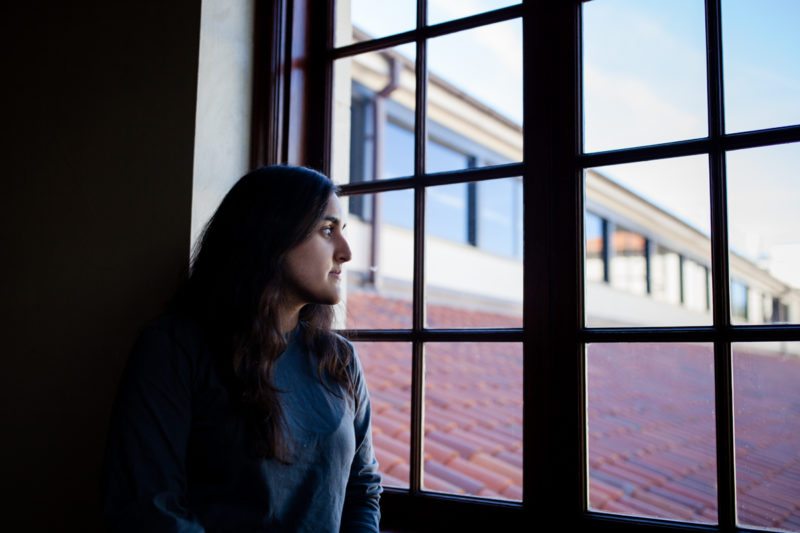
Kany Abdullah, a UT sophomore studying international relations, was born in Texas a month after her Kurdish parents left Saddam Hussein’s Iraq. As Kurds, Abdullah and her family often feel unwelcome: “We don’t have anywhere to go. No one wants us.” Austin Price/Reporting Texas
Struggling to feel ‘fully American’
Kany Abdullah, 19, is the daughter of a “forgotten people.” Her family, members of Iraq’s Kurdish ethnic minority, fled their home country in 1996, to escape persecution by the government.
“Where is home? I still have no idea,” she says.
Abdullah’s grandparents, who have remained in Iraq, are reaching the ends of their lives. With legal battles over the Trump travel ban continuing, Abdullah and her mother have cancelled plans to travel to Iraq to visit them this summer.
An uncle has been waiting for seven years to obtain a visa to join the family in the United States. He is gravely ill, suffering from epileptic episodes. The presence of ISIS forces near his city has blocked vital supply lines for food and medicine. In light of the travel ban, Abdullah says efforts to bring him to the United States for life-saving treatment are “all useless.”
The idea of a permanent country to call home has long escaped the Kurdish people, who live in parts of Syria, Turkey, Iran and Iraq. They have never had a nation-state of their own.
“We don’t have anywhere to go. We have been trying to survive,” she says. “No one in the region wants us.”
A month after her family finally arrived in Dallas, Abdullah was born. Even though she is a U.S. citizen, Abdullah says she has struggled throughout her life to “fit in and feel fully American.”
She plans to graduate in May 2019 with a double major – international relations and geography – which she would like to put to use working for a non-profit or NGO. Abdullah says she will stay in this country long-term, recently imagining she could one day become the president of the United States.
“That’s my end goal. I wish to be one of, if not the first, American presidents who is culturally aware and is multilingual.”
— Taylor Jackson Buchanan
‘More prominent issue now’
Samer Yousif, a graduate student in global policy at UT-Austin’s LBJ School of Public Affairs, might have to cancel his plans to visit the holy city of Mecca in Saudi Arabia over the uncertainty surrounding President Trump’s travel ban. He planned to visit Mecca in May with his family to perform the Umrah, a pilgrimage that Muslims can do any time of the year, as opposed to the hajj, the annual event that attracts millions of worshippers.
Even though they are dual Sudanese and American citizens, Yousif and his family members are not comfortable leaving the country, given the current uncertainty. “President Trump doesn’t seem to care about how this is going to affect people,” Yousif, 23, says.
Yousif was 6 when he moved to the U.S. in 1999. His family had previously spent some years in Saudi Arabia. Yousif still has family in Sudan, including around 20 of his father’s siblings, as well as relatives in Dallas.
One family member works as a medical practitioner in Saudi Arabia but is looking to return soon to the U.S. The travel ban, if enforced, would block her from entering the U.S because she is a Sudanese citizen.
“Muslims weren’t any less oppressed when Obama was president either. But it’s a more prominent issue now due to the media attention it has received,” Yousif says.
—OmarRodríguez Ortiz
‘I try to show my happy side’
Through the ups and the downs of her life in the past five years, something often has been missing in Rana’s life — her parents.
Over the past five years, Rana has earned a doctorate, married and divorced. But because of difficulties securing visas, her parents seldom were able to visit from Tehran, her hometown. Now, with uncertainty over Trump’s travel ban, she doesn’t know when they’ll be reunited.
“I try to tell them to look at the positive side of things in every situation,” she says.
In 2012, Rana, 29, moved from Iran to the U.S. to complete her doctoral degree in mechanical engineering at the University of Pittsburgh. She is now working on a postdoctoral fellowship in cardiovascular mechanics at UT Austin.
Her American friends have helped to fill the gap left by family. “That shows me that, like in Iran, the government and the people are separate.”
She video chats with her parents and tries her best to stay upbeat.
“If I go in front of the Skype and cry, it doesn’t help anything. It just makes them sad. So in every situation, I try to show my happy side.”
Trump’s travel ban had an immediate effect on Rana. Her parents were planning another visit soon, but their visa interview was cancelled. Rana also is uncertain whether she will be able to extend her own visa when it expires in April.
“I cannot wake up every day to check the BBC News to see what will happen. Now green cards cancelled, now citizenship cancelled, now job cancelled, now visa cancelled. I want to be relaxed… I’m not sure if I’ll get a better offer outside of U.S. but, if I do, I (will) choose that one.”
—Omar Rodríguez Ortiz
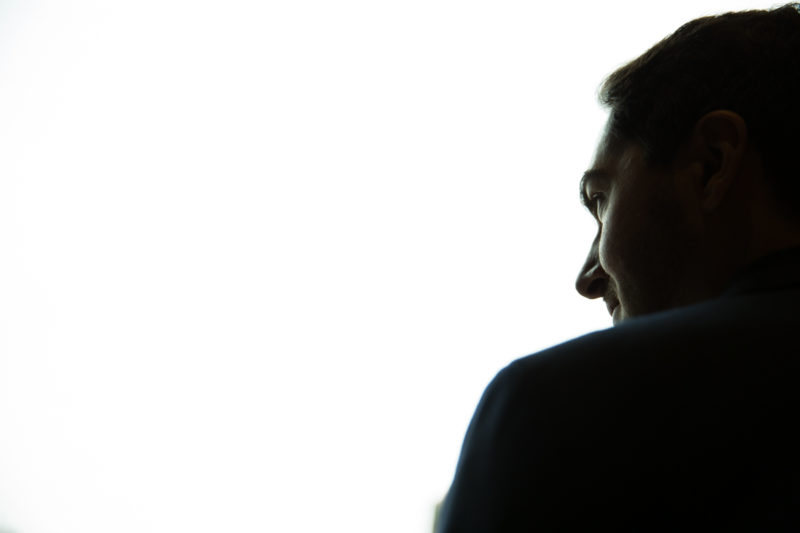
Shiva and Mehdi, a recently married Iranian couple currently living in Austin, are now preparing to leave the U.S. after their student visas expire. They requested their faces not be shown. Shelby Knowles/Reporting Texas
‘This unwelcoming message comes from ignorance’
After marrying in 2014, Shiva and Mehdi moved from Iran to the United States, seeking to continue their education. The recent travel ban has made them rethink their plans.
“I do believe that this unwelcoming message comes from ignorance and comes from people who have not met enough Iranians, Afghans, Iraqis or Somalis in person,” Shiva says.
Last summer, Shiva graduated from UT’s School of Architecture with a master’s degree in urban design. Mehdi finished a master’s in engineering at Texas A&M.
They are now anxious and scared. Shiva has been getting together with her friends almost every day to try to make sense of the situation.
“We didn’t have a Plan B,” Mehdi says.
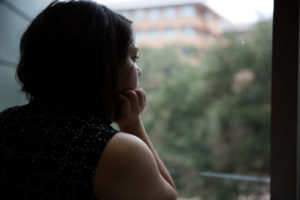
Shiva and Mehdi, a recently married Iranian couple currently living in Austin, are now preparing to leave the U.S. after their student visas expire. They requested their faces not be shown. Shelby Knowles/Reporting Texas
“Now we are making plans C, D, E, F,” Shiva adds.
They had hoped to start a business in Austin. Shiva works at an urban design firm, and Mehdi works for a non-profit. They are both in Austin under one-year extensions of their student visas that expire this summmer.
“We have to be very serious about making the ‘plan Bs,’” Shiva says. “We recently moved in together, we have just got new things, to call our house a home. And then I have to consider getting rid of everything extra… because if we have to leave, I cannot take much with me.”
— Alvaro Céspedes
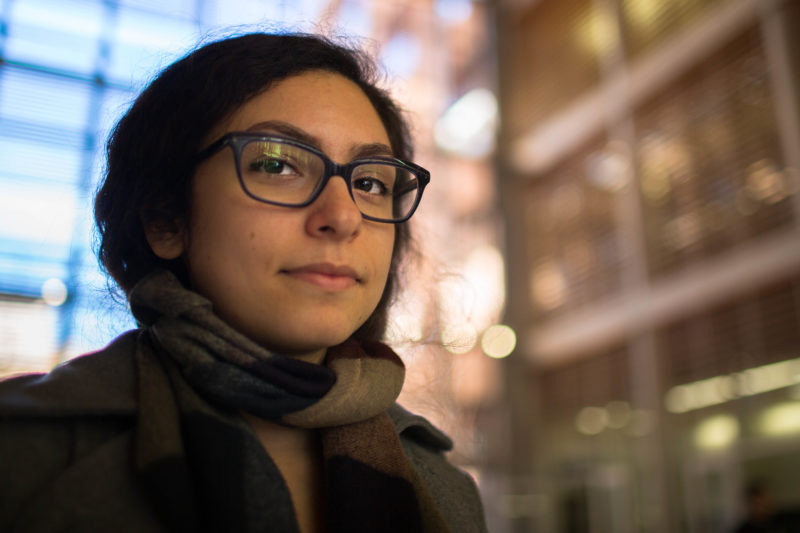
Iranian native Sepideh Maleki says the travel ban has stalled plans for her parents to visit her in Austin. Shelby Knowles/Reporting Texas
‘You don’t know what is going to happen next’
At first it was just a rumor. Sepideh Maleki, a doctoral student in computer science at UT Austin, was hearing troubling talk about a potential 30-day ban that would block Iranians from entering the U.S.
But she didn’t tell her parents. They were planning to visit her after almost three years apart, and a short-term ban wasn’t likely to disrupt their travels.
Then came President Trump’s executive order. Maleki was stunned. “I didn’t know what to do,” she says. “I didn’t really understand what was going on. Can someone really do that?”
Maleki is comforted by the federal court rulings temporarily blocking the ban, but still worried.
“Every day when I wake up and open my eyes, the first thing that I check is the news, to see if something new has happened or not,” she says. “Right now I’ve heard that people are able to come to the country, but still you don’t know what’s going to happen next.”
It isn’t clear whether the suspension of the ban will hold, and Maleki’s parents have not made concrete plans to visit.
Before the order, Maleki bought three tickets to a Roger Waters concert in Houston that she planned to attend with her parents. It was to be “a dream come true” for her father, a serious Pink Floyd fan. Now she’s waiting to see if she’ll get to use them.
“All the immigrants come to the United States for a better life, and because of that we make this country better,” Maleki, 27, says. “Just get to know us and you will see that we won’t harm even a single person, not even an animal, nothing.”
— Kaulie Lewis
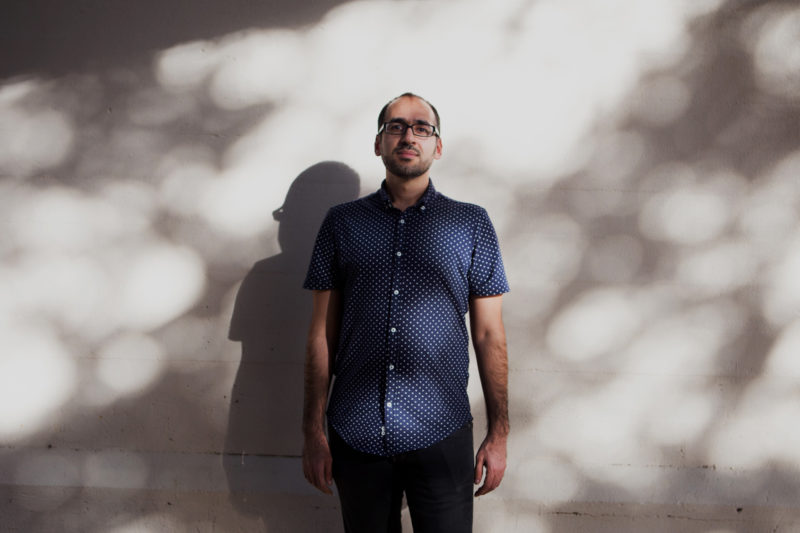
Originally from Iran, Omid Ravazi is an postdoctoral research fellow at The University of Texas. “It was a dream for me to come here and pursue my goal,” he says. Lynda Gonzalez/Reporting Texas
We’re not ‘a threat to any society’
Five days before President Trump issued his executive order, Omid Razavi was making plans for his parents’ visit to Austin in May to attend his graduation ceremony.
Razavi has not seen his father since he left Iran in 2011 to pursue a PhD in civil engineering. His mother has visited once.
Now their trip is on hold, and their weekly Sunday phone calls will have to suffice.
Razavi, 32, graduated in May and is a postdoctoral research fellow at the Center for Petroleum and Geosystems Engineering at UT’s engineering school.
He is in the process of applying for U.S. permanent residency through a national interest waiver, which the government grants to highly educated researchers on a case-by-case basis.
“I really don’t know how it is going to go through now,” he says.
He’s here on a single-entry visa, and there is no guarantee that it would be renewed if he left.
“It seems to me that if these restrictions remain the way they are, I have to choose between staying in the U.S. or being with my family. I can have one of the two; I cannot have them both,” Razavi says.
The lack of mobility also could complicate his career, because most research involves international collaboration, which requires international travel.
Razavi understands the security concerns facing the U.S. but questions whether the immigration ban is the most effective and efficient solution.
“I don’t know anything about immigration policy, so I cannot make a comment about what is the best way to do it. But I can certainly see that there are many people like me and many of my friends who do not pose a threat to any society, including the U.S., who are being affected both on a personal and professional level,” he says.
— Molly Smith
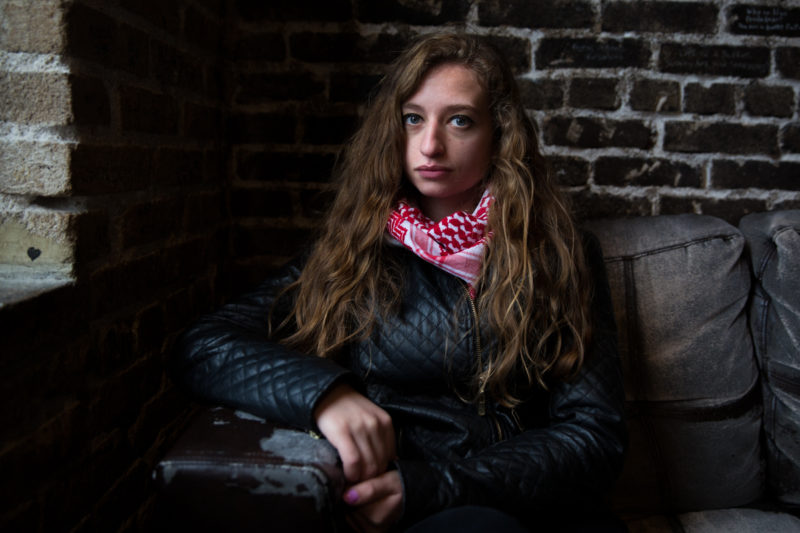
Nour, whose parents left Texas for Syria in December, is now concerned that they won’t be able to return for her graduation. Shelby Knowles/Reporting Texas
‘There’s no future for me in Syria’
Standing on the south steps of the UT Tower, cousins Nour and Citrine are pulling strips of tape off their mouths and discussing what to do with the signs from their silent protest. Nour’s reads: “In college for 8 years because of the war & now parents can’t come to my graduation.”
They had been part of a small protest on Feb. 3, just a handful of students against the travel ban that President Trump had signed a week earlier.
Both had been publicly outspoken in the past about the Syrian civil war, but now don’t give their last names out fear that the ban, if ever enforced, would put their family’s lives in danger.
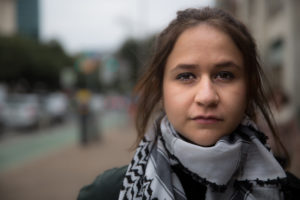
“Whenever you live in such a privileged country, you don’t consider what happens to others—it’s not your problem,” says Citrine, a senior at UT. “It’s a problem.” Shelby Knowles/Reporting Texas
“We chose to have a silent protest because we are oppressed voices,” Nour says. “But we want our message to be delivered.”
Nour, 24, became a pro-refugee, anti-Syrian government activist when she moved to the United States four years ago for college. She earlier had studied for three years at Damascus University, then spent a year in Egypt trying to obtain a U.S. visa.
Because of her prior protests, her family name — tied to a well-known brand in Damascus — has appeared in a few Texas news stories. She worries that the Syrian government will see the articles online. Citrine has the same last name.
“Now, if I go home, that’s not going to be pretty,” Nour says. She says some of her friends have been killed in the Syrian conflict.
Anxiety over whether she’ll be able to renew her student visa consumes her. Nour will graduate this year from the University of Texas with a degree in English literature and would like to pursue graduate school.
“If I apply to UT or Texas State and I go there … I don’t want to start school and then be kicked out,” she says. “I can’t go back home. There’s no future for me in Syria.”
She is having difficulty finding programs in Europe that accept Syrian students, and she doubts that Canada is an option because she does not have refugee status.
“It’s just up in the air. I don’t know what the next step is,” she says.
Nour’s parents came to Texas a year ago to open a factory. They returned to Syria in December to check on their family and the business there. But they are unable to return because, according to their lawyer, it’s now unlikely they’ll be able to re-apply for visas. That means they won’t be able to attend her graduation.
Citrine, 21, who is a U.S. citizen, remembers what it was like for American Muslims following 9/11. For a time, she says, the negative sentiment died down, but now it has resurfaced.
“We’ve always had this sort of anti-Islamic rhetoric,” she says. “But now people are starting to feel comfortable with it.”
If Nour could address President Trump, she says she would ask him why he wants to build a wall along the U.S.-Mexico border, flush out immigrants and reject refugees. Her concerns are not just for Syrians, but for everyone trying to find a better life. She simply asks that as human beings, we be “less selfish.”
— Louise Rodriguez
‘I am not a terrorist’
“I am a human being. I just want to live in peace and security,” says Ghada Housen, a lecturer of the Arabic language at UT-Austin.
She does not understand why anyone would think she is dangerous. “I am not a terrorist.”
The conflict in her home country, Syria, is the deadliest of the 21st century so far. Housen, who declined to giver her age, was born and raised in Damascus but left before the Syrian civil war started five years ago.
She obtained a work-and-study-related visa to teach in the United States and has worked as an instructor at UT since 2010. But the visa expires in August.
Housen faces the likelihood of having to return to a country under siege.
“I love my job; I love my students. They are my whole life. I don’t do anything other than teach and sleep and call my family” in Syria, she says.
Facing an uncertain future in the U.S., Housen says she will go wherever there is work. She wants to continue to teach the Arabic language and culture at a university.
“I don’t feel like a stranger here. I feel like this is my home,” Housen says. “But I am afraid about the future. The decisions made by the government make me feel unsafe.”
–Taylor Jackson Buchanan
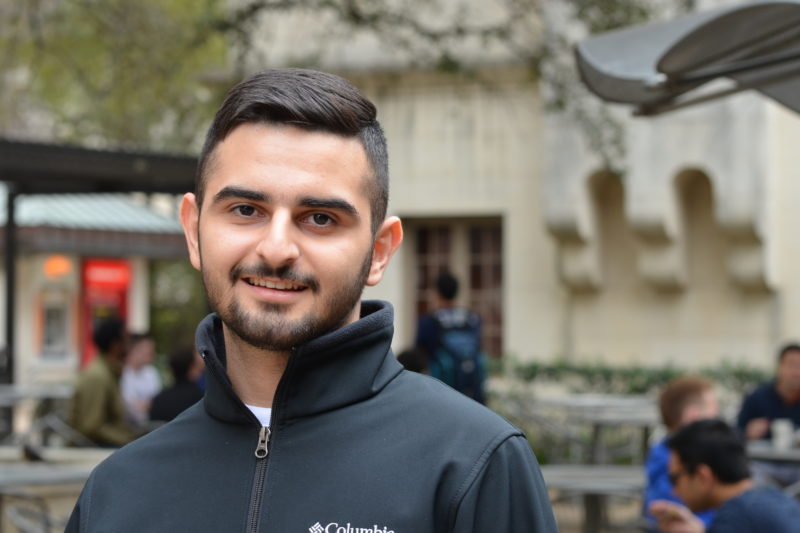
“We … want to come here and study and not worry if we’re going to see our family or if we’re going to get deported,” says Dana, a sophomore at UT. Louise Rodriguez/Reporting Texas
‘We come here in peace’
Dana greets us in the food court of the bustling student union. His casual clothes and friendly attitude blend into the campus culture.
The travel ban has thrown his otherwise carefree life into confusion.
Dana, a 19-year-old sophomore, finds himself torn: Leaving in the middle of his computer science program at UT would mean restarting his studies in another country, where the academic system and student culture would be different.
His mother wants him to transfer to a university outside of the United States, perhaps in Canada or the United Kingdom. “She was like, ‘You can’t not see your family for three years,’” he says.
Staying at UT might mean remaining in the U.S. through graduation because he wouldn’t want to risk being unable to reenter the country. He is supposed to attend his sister’s wedding in Iran this summer but now is not sure if that will be possible.
His days are filled with worry, which takes a toll on his ability to focus on his academic work. “We’re just trying to get a better education,” he says, “and imposing these kinds of unfair bans, especially on students, will make it harder on us.”
Dana says he appreciates the outpouring of support he has received from campus friends, protestors and UT leadership.
Students from the Middle East endure a long, difficult process to be considered, let alone accepted, by an American university, he says. Iranians must travel to another country to take the SAT because it is not offered in their country, and they must communicate in English proficiently enough to do well on the exam. Then, from this small pool of people, U.S. universities pick only what Dana describes as “the best and the brightest.”
“So the people who come here are very determined to get an education, to prosper, to help themselves, to help the world,” he says. “I would ask President Trump not to view us as enemies or possible threats, but as opportunities to make the world a better, safer place. We come here in peace.”
— Louise Rodriguez
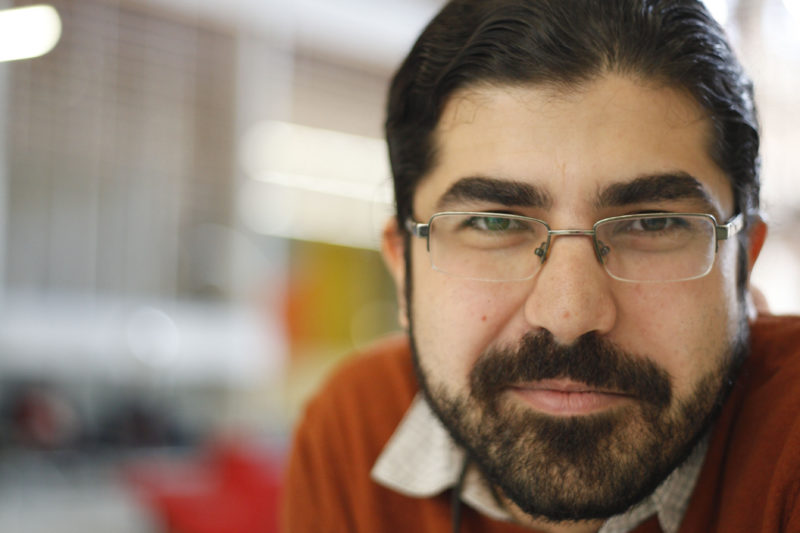
Navid Yaghmazadeh’s laptop bears the message: “I am from Iran. I am a student. I am NOT a terrorist. I am NOT scary!” He has been quick to speak up in the wake of President Donald Trump’s executive order that bans people like Yaghmazadeh from seven Muslim-majority countries,
including Iran, from entering the United States. Dani Neuharth-Keusch/Reporting Texas
‘I can’t just remain silent’
The symbols inscribed on Navid Yaghmazadeh’s necklace spell “azar” — the Persian calendar month in which he was born and the Farsi word for fire. For Yaghmazadeh, President Trump’s executive order both fueled a flame and sparked action.
“I can’t just remain silent,” he says. “I should speak up. And that’s what I’m going to do.”
Yaghmazadeh’s fire is not new. As an undergraduate student in Iran, he took part in mass student protests against Mahmoud Ahmadinejad’s 2009 presidential election and spent a few days in jail.
The following year, he began his doctoral studies in computer science at UT. “You think, ‘I’m coming here for freedom of speech … and then you are treated in this way,” he says.
His F1 visa is up for renewal on May 31. The 29-year-old had planned to graduate at the end of this year and continue working in the U.S., which has the best opportunities for employment in his field and where he has found a welcoming community. “I want to be here, if I am welcomed by the government,” Yaghmazadeh says.
He says he worries more about the safety of Syrian refugees fleeing the Islamic State than he does about his own future. Despite policies such as the ban, he hopes things will get better.
“I hope one day we can see all people treated equally based on who they are, not based on tags we have attached to them.”
— Dani Neuharth-Keusch
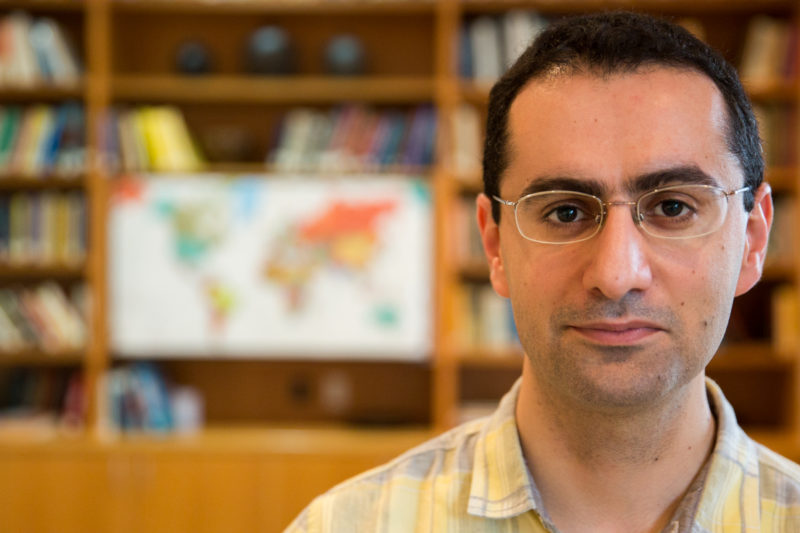
Arash Fathi was born in Tehran in 1982 and is now part of the Department of Aerospace Engineering and Engineering Mechanics faculty in the University of Texas at Austin. Shelby Knowles/Reporting Texas
‘Doing a good job requires peace of mind’
Arash Fathi develops software that performs ocean modeling and pollution studies on high-performance computers. Fathi and his colleagues at the Cockrell School of Engineering try to predict, through simulations, how an oil spill might affect fisheries or tourist destinations.
He earned his bachelor’s and master’s degrees in Tehran, capital of his native Iran, before coming to the UT in 2009 to pursue a doctorate. “My master’s adviser did his PhD at UT-Austin. Because of that, I became interested,” he says. Fathi, 34, speaks in a thoughtful, calculated manner with a British accent.
The Trump administration’s attempt to restrict U.S. travel for citizens of seven majority-Muslim countries has left Fathi feeling insecure. “Doing a good job requires peace of mind. This kind of instability and chaos goes on, people will be occupied, at least part of their energy will be wasted by this news and thinking about what will happen next,” he says.
Fathi expects thing to get worse. “Iran is doing its missile tests, and there is no way we can stop this,” he says. “This just creates more risk for Iranian students that are trying to get jobs here.”
He plans to stay in the United States, at least for now, and is optimistic that the tumult will subside. “First they said no green card, and then they let the green card [holders] in. They suspended our petitions and applications, and it appears that it is going back to normal now, so it’s too early to make a decision.”
He thinks of life in Iran and concludes that he’d rather stay in the U.S.
“After all, there is order here, and that is pleasant,” he says before starting to laugh.
— Alvaro Céspedes
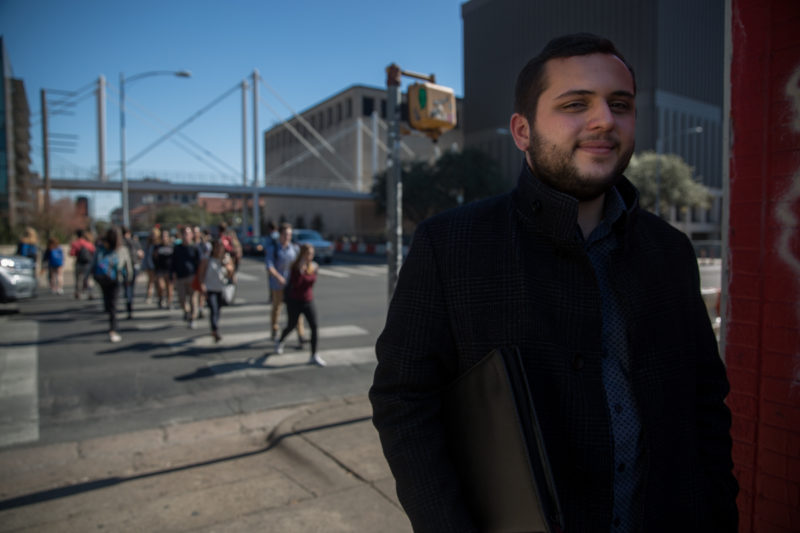
“He’s never going to do it, that’s crazy,” remembers Bijan, a UT graduate, when thinking back on his immediate reaction to Trump’s win. At the time, a ban on Muslim nations was “probably paranoid” thinking.
‘The beginning of something much, much scarier’
Bijan, 23, meets us at a restaurant on The Drag. He has asked us not to mention his immigration status or his last name. He’s become more cautious in recent days. We grab a seat on the patio, and he pulls out a stack of documents from a briefcase and sets them on the table. The title reads EXECUTIVE ORDER: PROTECTING THE NATION FROM FOREIGN TERRORIST ENTRY INTO THE UNITED STATES.
He shows one section he has marked. “It’s extremely clear that it affects dual nationals.”
Born and raised in Germany, his father originally from Iran, Bijan is a citizen of both countries. He is a project manager at an Austin-based company on a one-year student work visa called an F1 OPT. He’s convinced he will be rejected if he tries to renew when it expires in July.
When Bijan first read a draft of the executive order, he grew extremely angry and frustrated. “I thought, ‘All right. This is it.’ For 48 hours I did nothing but think, OK, when is he going to sign it? Then on Friday [Jan. 27], I watched it live on YouTube.
“Then I went and got absolutely wasted on Sixth Street.”
He had expected to stay in the U.S. for the long term. He came here to earn an MBA at the University of Texas’s McCombs School of Business through a partnership with the Otto Beisheim School of Management in Germany, where he earned a bachelor’s degree. But now he views the U.S. as “moving toward a fascist dictatorship” and wants to leave.
“It’s just the beginning of something much, much scarier,” he says. “You have this large, vocal population — incidentally, a population that’s armed — that is going to be able to overrule the fundamentals that this country was founded upon.”
“Nobody should worry about me so much, but you should be worried about yourselves.”
In German schools, Bijan learned about Hitler’s rise to power. Among the lessons, he says, is the fact that the Holocaust did not happen overnight. It happened in steps, starting with the imprisonment of those who opposed the German leader.
An atheist whose mother was an evangelical Christian, Bijan believes President Trump’s plan to stamp out what the president calls “radical Islamic terrorism” by banning people like him will never work. He adds that no one who has come from Iran has been involved in a terror attack in the U.S.
“It’s actually f—– up,” he says with a laugh.
— Louise Rodriguez

Maryam Mirabolghasemi wants to do research in U.S. related to climate change. She’s now considering moving to another country to do the work. Shelby Knowles/Reporting Texas
‘I really highly doubt’ ban will make anyone safer
Maryam Mirabolghasemi’s problems started years before President Trump imposed a travel ban on citizens of her home country, Iran.
She arrived at UT in 2011 to study petroleum engineering. A year later, then-President Barack Obama made it harder for Iranian students in energy-related majors to get visas due to concerns about nuclear security.
Although Maryam already was in the United States, she knew that she would not be able to get back in if she traveled to Iran. So she hasn’t seen her family in more than five years.
Even with the federal court order that temporarily suspends enforcement of the ban, Maryam faces uncertainty, added to the dilemma of whether to reunite with her family and go back to the Iranian regime she ran from or continue to pursue her dream of doing climate change research in Austin.
“They can deport all of us. It’s their right. It’s their country. They can stop admitting immigrants, but I really highly doubt that this is going to make anyone any more safe. There are more serious things going on in other countries,” Maryam says.
A day before Trump’s executive order, her brother, who is studying at McGill University in Montreal, obtained a visitor’s visa to attend Maryam’s graduation in May. Now they fear that it is useless.
“The visa is in his passport but he can’t use it, even though he paid and everything. But I think he’s in a better mental situation. Canadian people are very supportive. McGill is a great university,” says Maryam, 33, who is considering the Canadian institution as the best option to continue her studies.
“I am not going stay here for another five years not visiting my family, that’s for sure. I can’t do that anymore.”
Meanwhile, Maryam is struggling to focus on her final project at UT. With her family so far away, her only support comes from friends and peers.
“The UT community has told me, ‘You are always welcome here.’ It’s nice that there are people who don’t look at us like terrorists, who think that we can contribute to this society too.”
— César E. López Linares
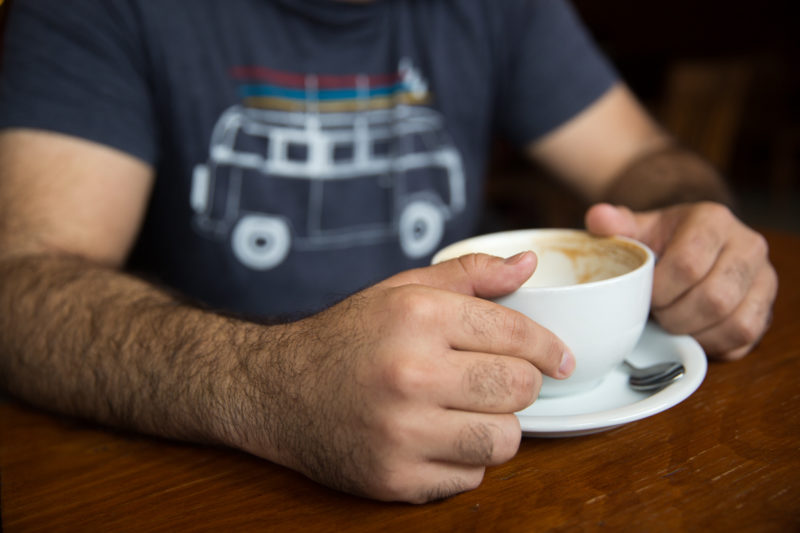
Shambat, 34, is a postdoctoral researcher in biophysics at UT. He requested his face not be shown. Shelby Knowles/Reporting Texas
‘It’s really sad I can’t see my father’
On Feb. 5, Shambat marked three years in the United States — and three years since he’s seen his family in Iran.
The 34-year-old postdoctoral biophysics researcher came to UT in July after completing a postdoctoral fellowship at the University of Chicago. “I loved Chicago,” he says. “I love Austin as well.”
Last summer, Shambat’s aging father in Iran needed surgery. Due to his single-entry U.S. visa and pending application for a national interest waiver — a path to permanent residency available to highly educated researchers — Shambat was not able to be at his father’s side for fear of interrupting the immigration process.
“Maybe even if I was there I couldn’t do anything, but it really feels bad when you just see that you can’t be there,” he says.
Now Shambat waits, anxiously, to be issued an employment authorization document, known as an EAD/AP card, so he can travel to see his family.
“I was really excited to have that card,” he says. “I was planning to go back for the Persian New Year, which is exactly within the three months of [President Trump’s] executive order.”
When Shambat went online to check the status last week, it appeared that the card had been issued. When he looked again the other day, the message was different: “It said your application is just received.”
Whether or not he gets the document, Shambat has canceled the trip planned for March. He’s worried he would not be allowed back into the United States. “I’m really sad that I can’t see my father,” he says, his voice shaking. “I don’t know how much time we have.”
Although the immigration process has never been simple, the Trump administration’s words and actions are causing Shambat and his wife to rethink their dream of permanent residency in the U.S.
“Here, it’s like we are in prison, but it’s a very nice prison, because we have nice inmates,’” says Shambat, gesturing at the bustle of a coffee shop on the edge of UT’s campus. “We had a lot of problems [in Iran], but it was my country. I loved it. I had my family and my friends. We came here for a better life. So if it’s not going to be better, then we’ll go back.”
–Kathryn Lundstrom
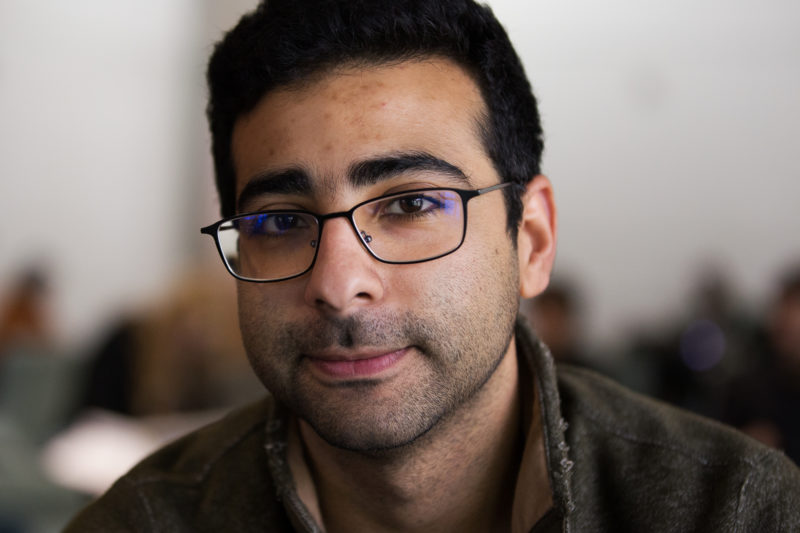
Rambod Tabasi left Iran in 2008 to pursue higher education overseas. He is now a doctoral student at UT Austin, studying Engineering Mechanics. Kara Henderson/ Reporting Texas
‘As a nation, we are being targeted’
Hope and opportunity brought Rambod Tabasi to Austin. Now, he’s anxious about staying in a country whose president wants to ban citizens of Iran, his home, from entering.
After finishing a master’s program at Imperial College in London, Tabasi, 25, is a doctoral candidate in UT’s Cockrell School of Engineering.
“I don’t know how far they’re going to push this,” he says, with a tone of resignation. “President Trump made us think whether we’ve chosen the right country or if it’s worth it staying here.”
The travel ban has left him angry and upset. He does not understand why Iran is being considered as an exporter of terrorists.
“Now we have the feeling that, as a nation, we are being targeted, while no one can think of an Iranian causing problems” in the U.S.
Tabasi is considering moving to another country, but says he won’t go back to Iran, where fear of prosecution is persistent. “Every time I go back to Iran, I get anxious about getting arrested. I’ve worked in a couple of companies that the Iranian government didn’t approve.”
Tabasi recently got engaged and was expecting his family to visit to celebrate the good news. The reunion now seems unlikely; his siblings live in Canada and the United Kingdom.
“Targeting a whole nation shouldn’t even be on the table,” he says.
He is aware of Trump’s reputation for stubbornness.
“There are people that, no matter what you say, they will think the way they want to think, so you’d rather not waste your time,” Tabasi says.
Regardless of the adversity, he values the importance of cultural exchange and understanding as a means to achieve peace.
“All we are trying to do recently is letting people know about our culture… I’ve seen people who don’t even know where Iran is. It is time that the whole population learns more about other countries.”
— Alvaro Céspedes
‘Everything is on hold’
Omid Zandi hasn’t seen his family in Iran in more than five years. As a doctoral student at Michigan State University on a single-entry visa, he was worried even before Trump became president that he wouldn’t be able to get back into the United States if he left.
But when he got a job as a post-doctoral researcher at UT’s Cockrell School of Engineering, Zandi applied for a green card, beginning the long process of establishing permanent residency in the U.S.
His in-process green card application –- and the travel permissions the application allowed him — gave Zandi, 30, the confidence to book a March trip to Tehran to celebrate the Persian New Year.
“I told my family,” Zandi says. “Everybody was waiting for this. I bought gifts and packed half my suitcase to go home.”
Then he heard about the travel ban, and it felt like a punch to the gut.
“I’ve canceled everything,” he says quietly. “Everything is on hold.”
That “everything” includes his career ambitions. Zandi’s job at UT-Austin is set to expire this summer, and he has been interviewing for other positions. After hearing that green card processing had been halted, potentially jeopardizing his right to work in the country, Zandi ended his job search until processing resumed. He’s simply hoping for the best.
But Zandi pauses to emphasize something very important to him. “The people who leave Iran, they want to follow their dreams,” he says. “They are usually in top universities, and they come here, they become doctors, engineers, professors.”
The news coverage he and most Americans see rarely includes the positive contributions Iranians make to this country. To Zandi, it all connects to a core cultural misunderstanding. “We call this brain drain at home, but here they call it ‘national threat,’” he says.
He sees a simple solution: “Talking to people, getting to know people, this is the way to do it. We should communicate more, so that we can see that we are no different.”
— Kaulie Lewis
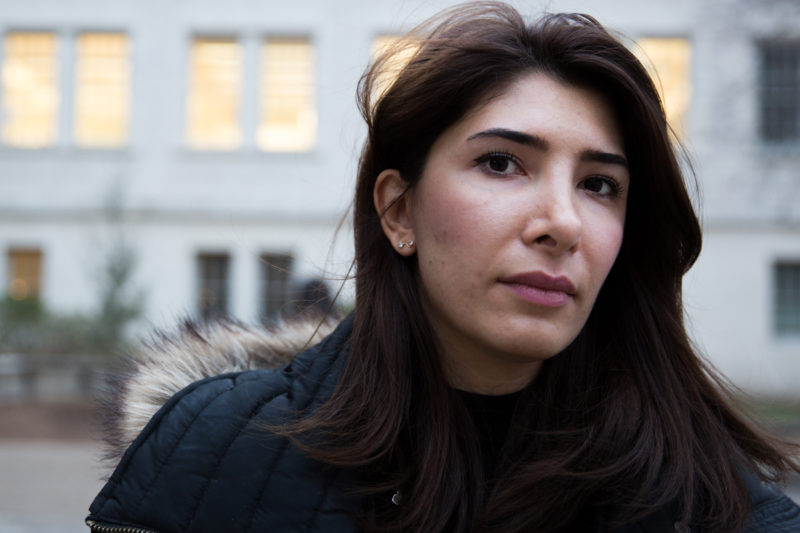
Moggan Motamed, 32-year-old from Iran, expresses concerns about her inability to see her family and the travel ban ordered by President Trump. Shelby Knowles/Reporting Texas
‘I don’t know what’s going to happen next’
Visas have been a problem for Moggan Motamed and her family since long before President Trump’s executive order, but until now the juice has always been worth the squeeze.
Last May, Motamed prepared to graduate with a doctorate in transportation engineering after seven years at UT. Like most students, she was excited to share her accomplishments with family and walk across the stage in her regalia. Due to the long, unpredictable and arduous visa process Iranians face, however, her family was unable to attend the ceremony.
Throughout her time in the United States, the likelihood of her parents’ visiting the country has been slim. “For some reason, people think getting a visa was easy before, but it wasn’t easy at all,” Motamed says.
Prior to 2011, Iranian students were issued only single-entry visas. That type of visa allows students into the U.S., but if they leave, they must reapply — a process that can take up to a year.
For Motamed, 32, wading through the unpredictable visa process was worth the chance to study at one of the top engineering programs in the world.
“I came to the United States because it’s the land of opportunity and immigrant friendly — at least it used to be,” she says. “I was planning on going home in March, but with this ban I cannot go home.”
After graduating, Motamed accepted a job in Maryland and began settling into professional life. The new executive order might uproot her again.
“I never thought of leaving the U.S. except the past two weeks,” she says. “I like it here. It’s very immigrant-friendly. Nowhere is perfect, but it was somewhere I could see my future. But now, I don’t know what’s going to happen next. I’m considering applying for permanent residency in other countries, like Australia, Canada or the U.K. … They’re much more friendly.”
Moving to a new country, or city, is a difficult decision; it takes time to get familiar with a new culture and build a network, and it’s expensive, Motamed explains.
“I finally thought I was settling down and getting stable,” she says. “Apparently not.”
— Shelby Knowles